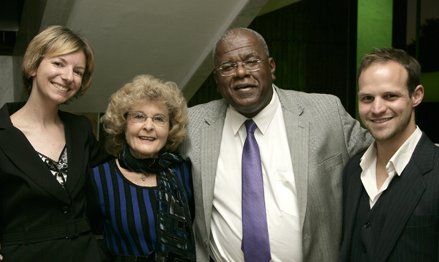Latest News Archive
Please select Category, Year, and then Month to display items
31 January 2024
|
Story EDZANI NEPHALELA
|
Photo ANJA AUCAMP
 Dr Martin Laubscher’s thesis, crowned with the Andrew Murray-Desmond Tutu Prize, is testament to the university’s unwavering commitment to scholarly excellence.
Dr Martin Laubscher’s thesis, crowned with the Andrew Murray-Desmond Tutu Prize, is testament to the university’s unwavering commitment to scholarly excellence.
In a historic triumph that reverberates over four decades since its inception, the UFS has clinched the coveted
Andrew Murray Prize – now renamed the Andrew Murray-Desmond Tutu Prize – for the first time. Standing shoulder to shoulder with institutions such as the University of Pretoria (UP) and Stellenbosch University (SU), this achievement marks a significant milestone in the UFS’ journey.
At the heart of this accomplishment lies the profound contribution of
Dr Martin Laubscher, distinguished Senior Lecturer specialising in Practical and Missional Theology in the
Faculty of Theology and Religion. Dr Laubscher’s dedication and scholarly prowess culminated in the groundbreaking work titled
Publieke teologie as profetiese teologie? (Public theology as prophetic theology), a revised edition of his doctoral thesis, which was originally crafted at Stellenbosch University in 2020, with a focus on the eminent Karl Barth.
Dr Laubscher received the Andrew Murray Prize for Theological Books in Afrikaans for his research and insightful analysis. The journey started when he realised, under the guidance of his study leader,
Prof Dion Forster, that his script had the potential to be published in Afrikaans. Sun Media’s interest in publishing this work in Afrikaans, led to it being the first-ever published thesis in Afrikaans. Dr Laubscher recalls, “I was grateful and excited about Sun Media’s interest. The book emerged within a year, and during a celebratory launch Prof Forster suggested I submit it for the Andrew Murray Prize.”
Earlier this year, Dr Laubscher was excited to learn that he was being shortlisted for the prestigious award. Reflecting on the significant moment, he shares, “The elation I felt upon receiving the news was unparalleled. I was not only celebrating a personal triumph, but also etching my name as the first laureate from our faculty to secure this prestigious accolade.”
'England, the English and the problem of education in South Africa.’
2013-09-26
|
 |
Attending the lecture were, from the left: Dr Susan Brokensha, Senior Lecturer: Department of English; Prof Rosemary Gray, Professor Emeritus (Honorary Life Vice-President of the English Academy of Southern Africa); Prof Jonathan Jansen; and Dr Thinus Conradie, Lecturer: Department of English.
Photo: Johan Roux
26 September 2013 |
Prof Jonathan Jansen: Lecture
The university celebrated the life of one of South Africa's most renowned art critics, hosting the 2013 English Academy’s Percy Baneshik Memorial Lecture on the Bloemfontein Campus.
The keynote lecture was delivered by Prof Jonathan Jansen, Vice-Chancellor and Rector, who joined a distinguished list of speakers to have delivered the lecture. Presented annually by the English Academy of Southern Africa, an association dedicated to promoting the effective use of English as a dynamic language in Southern Africa, past speakers include Prof Es’kia Mphahlele, Prof Njabulo Ndebele, Dr Alan Paton and Prof Albie Sachs. The lecture is hosted at venues across the country and this year Bloemfontein paid tribute to Percy Baneshik.
In his speech Not even colonial born: England, the English and the problem of education in South Africa,' Prof Jansen addressed the dilemma of the politics of language in both school and university education today.
Talking about the dominance of English in schools, Prof Jansen said it is the language of choice because indigenous languages are so poorly taught. "Simply learning in your mother tongue is absolutely no guarantee of improved learning gains in school. The problem is not the language of instruction; it is the quality of teaching, the knowledge of curriculum and the stability of the school."
Prof Jansen told the audience in the CR Swart Hall that Afrikaans-exclusive, or even Afrikaans-dominant white schools represent a serious threat to race relations in South Africa. "You simply cannot prepare young people for dealing with the scars of our violent past without creating optimal opportunities in the educational environment for living and learning together."